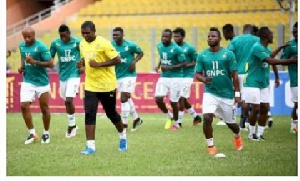Ghana, a West African country renowned for its passion for football, is witnessing a precipitous decline in the sport's fortunes.
The senior national team, the Ghana Black Stars, has endured a drought of major tournament victories spanning decades.
The latest setback, a 2-0 loss to Sudan's national team, has left fans reeling and calling for radical reforms.
A Legacy of Excellence
Ghana's football heritage is rich and storied. The Black Stars have won the African Cup of Nations four times (1963, 1965, 1978, and 1982) and produced iconic players like Abedi Ayew, Tony Yeboah, and Samuel Kuffour. However, since their last major triumph in 1982, the team's performance has been marked by inconsistency and underachievement.
*Corruption and Mismanagement: The Root of the Problem*
Fans and pundits alike point to corruption and gross mismanagement within the Ghana Football Association (GFA) as the primary causes of the decline. Allegations of embezzlement, cronyism, and nepotism have plagued the organization, eroding trust and undermining the sport's development.
Youth Development: A Neglected Area
Proponents of reform advocate for increased investment in youth football, citing the need for:
1. Inter-school competitions to identify and nurture talent.
2. Colts soccer programs to develop young players.
3. Youth academies affiliated with major clubs, supported by government investors.
This approach would:
1. Create a robust talent pipeline. 2. Foster a competitive spirit among youngsters. 3. Ensure a steady supply of skilled players for the national team.
Government Intervention: A Necessary Step
To revitalize Ghanaian football, many argue that government intervention is essential. This could involve:
1. Increased funding for grassroots programs.
2. Infrastructure development (stadiums, training facilities).
3. Regulatory oversight to ensure accountability within the GFA.
Consequences of Inaction
If the decline is not addressed, Ghana risks:
1. Losing its football legacy and reputation.
2. Missing out on economic benefits associated with hosting international tournaments.
3. Failing to inspire future generations of players and fans.
*A Call to Action*
The Ghanaian government, football authorities, and stakeholders must collaborate to:
1. Reform the GFA, ensuring transparency and accountability.
2. Invest in youth development programs.
3. Develop infrastructure and resources.
By taking these steps, Ghana can revitalize its football fortunes, restore national pride, and reclaim its position as a force in African and global football.
*Conclusion*
The decline of football in Ghana is a pressing concern that requires immediate attention. By acknowledging the problems, embracing reform, and investing in youth development, Ghana can rediscover its footballing glory. The hearts of millions of fans await.
By Dr. Charles Nunoo
Florida, USA
Opinions of Monday, 21 October 2024
Columnist: Dr. Charles Nunoo















